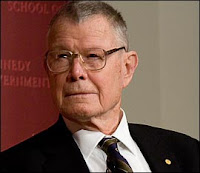Randomization of threats and promises

An extract from T. C. Schelling Economics Division, The RAND Corporation, P-1716 June 5, 1959 [Preventing deduction and anticipation in a zero-sum game] In the theory of games of pure conflict ("zero-sum" games) randomized strategies play a central role. It may be no exaggeration to say that the potentialities of randomized behavior account for most of the interest in game theory during the past decade and half (*). The essence of randomization in a two-person zero-sum game is to preclude the adversary's gaining intelligence about one's own mode of play -- to prevent his deductive anticipation of how one may make up one's own mind, and to protect oneself from tell-tale regularities of behavior that an adversary might anticipate. In the game that mix conflict with common interest, however, randomization plays no such principal role, and the role it does play is rather different. [Giving fractional/sampled information to avoid total war situations in a general game...
